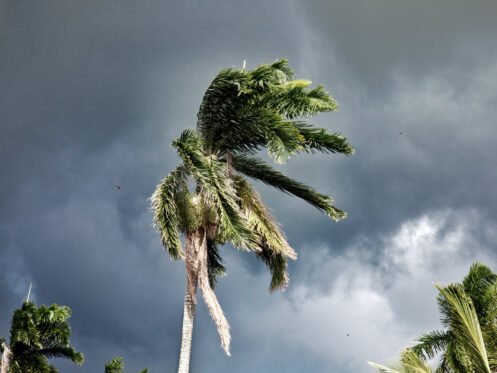Protecting important and valuable equipment, such as HVAC systems, during hurricane season can be a real challenge for some homeowners. These systems can be expensive, and they’re important for keeping your home comfortable. Fortunately, you can avoid possible damage, expensive repairs and long periods without climate control by prepping your HVAC system for hurricane season.
Understand the Risks to Your HVAC System
Before you can begin to take precautions, you must be aware of the dangers that hurricanes might pose to your HVAC system. Outdoor units are vulnerable to damage or dislodgement from strong winds, and exposed components are especially vulnerable to flying debris. Since water damage can corrode electrical components and cause mildew to grow inside the system, flooding is another big worry. Storm-related power surges could also cause damage to delicate electrical components.
Inspect and Secure Outdoor HVAC Units
Checking and securing your outdoor HVAC equipment should be one of your primary hurricane preparation tasks. Look for indications of wear or instability on the unit’s mounting pad or platform first. In the absence of strong anchors, you should attach the unit with hurricane straps or bolts. Make sure the electrical connections and refrigerant lines are well-insulated and safely inspected. To protect the unit from flying debris and strong rain, secure it with a tarp or an HVAC cover. To avoid damage from moisture accumulation, remove these covers after the storm passes.
Elevate Outdoor HVAC Units
Another important thing you can do to safeguard your outside HVAC unit from water damage in flood-prone areas is to have a professional help you raise it. Placing the unit on a solid base or concrete pad elevated above the local floodplain is the standard method for this. When in doubt about the proper height or the best way to elevate, it is essential to seek the advice of a qualified HVAC specialist or structural engineer. Although it may be a big task, it’s usually cheaper than buying a new system after a flood and can provide you with peace of mind when hurricane season rolls around.
Trim Trees and Shrubs Near HVAC Units
In the event of a hurricane, branches and adjacent plants might transform into hazardous projectiles, endangering your HVAC equipment. Be sure to prune any trees or bushes around your outside unit before hurricane season starts. Cut back any branches that are weak or dead so that there is at least three feet of clearance around the unit; this will help keep it safe from strong winds. In addition to keeping your HVAC system safe, this will also increase its efficiency by ensuring that air can flow freely around the unit.
Install Surge Protectors
Hurricanes can bring powerful power surges with them, which can seriously harm your HVAC system’s electrical components. One way to keep your HVAC system and all of your home’s electrical appliances safe is to install a whole-house surge protector. You might also want to think about getting a separate surge protector for your air conditioner, just in case. These gadgets can soak up extra voltage, stopping it before it can harm your system. Though they come at a higher price, surge protectors are definitely worth it when weighed against the cost of fixing or replacing an HVAC system that has surge damage.
Check and Seal Ductwork
Hurricanes can cause water to seep into your HVAC system’s ductwork if there are any leaks or improperly sealed joints. This is why you should keep an eye out for any indications of corrosion, loose connections or deteriorated seals in your ductwork. If you discover any small cracks or holes, you might be able to fix them with mastic sealant or metal tape. For larger holes, you’ll need to hire a professional to fix them. Water often finds its way in through cracks and crevices, so be sure to inspect any places where ducts go through floors, walls or the roof. Not only does properly sealed ducting prevent water damage, but it also enhances your system’s performance year-round.
Protect Indoor HVAC Components
During a hurricane, outdoor units are the most at risk, but it is important to protect indoor components as well. In basements or other locations susceptible to flooding, it is especially important to raise any interior equipment, like air handlers or furnaces, off the floor. Consider installing a water alarm next to your indoor HVAC system so that you’ll know right away if water gets in. Talk to a specialist about the possibility of moving indoor HVAC components to a higher floor if flooding is a serious concern in your area.
Create a Flood Barrier Around HVAC Units
If you live in a location that experiences flooding, you can take extra precautions by erecting a temporary flood barrier around your outdoor HVAC unit. Using sandbags or purpose-built flood barriers is one easy way to accomplish this. Make sure there’s adequate airflow while the unit is running and that the barrier is tall enough to prevent water from getting in. Always utilize additional safeguards in case of severe flooding; this strategy is not adequate on its own.
Develop an Emergency Plan for HVAC Systems
For prompt action during a hurricane’s approach, it is essential to have a well-defined emergency plan for your HVAC system. In this plan, you should lay out the procedures for properly turning off your HVAC system before the storm arrives, as well as a list of precautions to take and the number of your service providers. Learn where the main power switch is and how to securely turn it off, so that you and your loved ones are always prepared. Make sure to include in your plan how to switch your system back on once the storm is over.
Do Maintenance Before Hurricane Season
Keeping the filter changed on a regular basis is a preventative maintenance task that you can do yourself to ensure the HVAC system performs well during a hurricane. However, several professional maintenance tasks are just as important. In the months preceding hurricane season, have an expert come and check your HVAC system and make any necessary repairs. As part of this process, they will check the levels of refrigerant and examine the electrical connections to make sure everything is working correctly. A well-maintained system will be better able to withstand the effects of harsh weather.
Monitor Weather Alerts and Taking Precautions
Protecting your HVAC system requires staying aware of approaching storms. If a hurricane is in the forecast, turn on your weather alerts and get your emergency supplies ready. You may need to cover your outside unit, switch off the electricity and remove it from the outlet. You won’t have enough time to adequately secure your system if you wait until the last minute, so be ready to move swiftly.
Post-Storm Inspection and Maintenance
You should always check your HVAC system carefully before turning it back on after a storm passes. You must make sure the area around the outdoor unit is dry and clear of any debris. If you suspect water damage, have a professional evaluate the unit before turning it on to prevent additional damage or electrical concerns.
Ahoy! Cooling & Heating is here to help you prep your HVAC system for hurricane season in Temple Terrace, FL. We also help homeowners with ductless HVAC installations, duct cleaning, AC maintenance, UV light installations, zoning systems and more. Contact us today to learn more about keeping your HVAC system safe during a hurricane.

